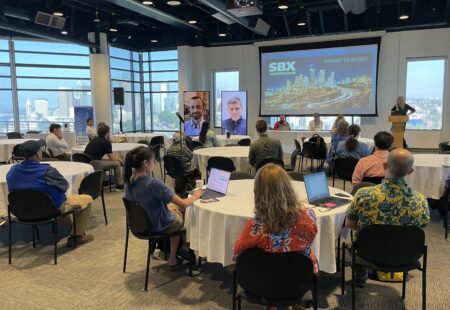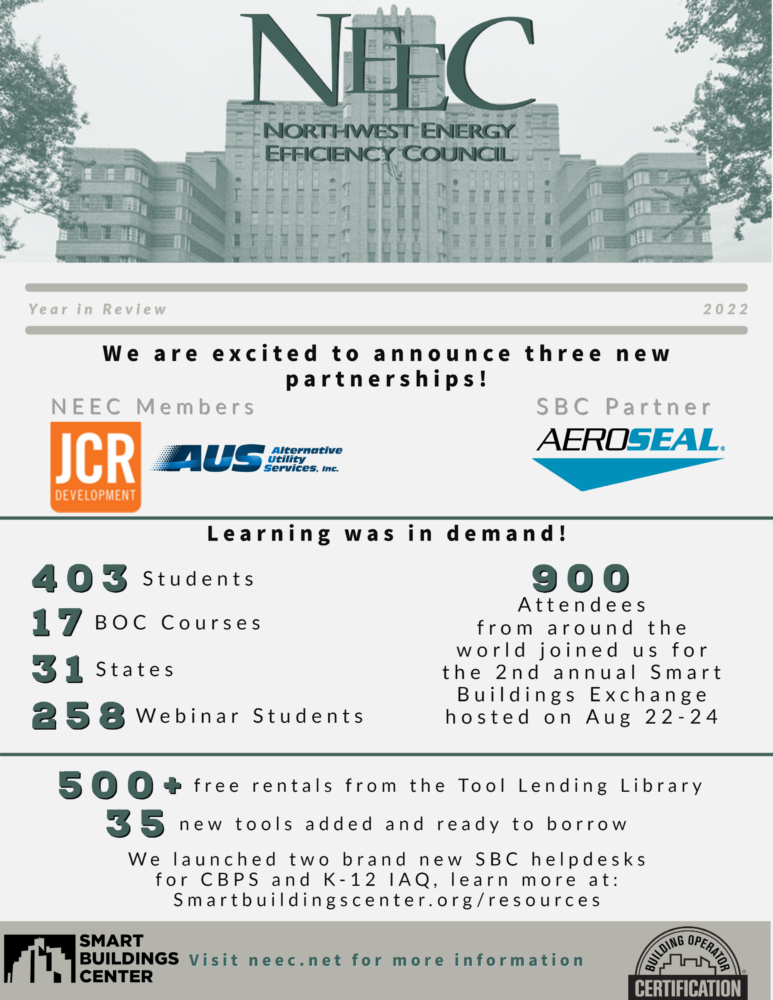2022 has been an exciting year at the Northwest Energy Efficiency Council (NEEC) and the Smart Buildings Center (SBC)! Over the course of the year, we saw an increased transition back from Covid isolation to a “new normal” or a new “normal for now.” We’ve seen more groups resume using our group conferencing spaces (the Training and Event Room and the Large Conference Room), to which we provide free access for the industry with a reservation via our online scheduling system. We added 35 tools to our Tool Lending Library, which continues to see robust usage, with over 500 free tool loans in 2022. The Smart Buildings Center held its first hybrid event with folks gathering on zoom and in-person at the Pacific Tower’s Panoramic Room for a discussion regarding how smart technology can support compliance with building performance standards. In the broader industry, there is a great deal of industry momentum with the passage of the Infrastructure Investment and Jobs Act (IIJA), the Inflation Reduction Act (IRA), and the shift to rulemakings and implementation on a large volume of state level and local policy. NEEC seized this moment to update our organizational mission to better articulate how the industry is evolving and what we’re all striving toward. Read on to hear more about our look back on 2022 and our look ahead to 2023.
Around the Region
In Washington, 2022 was another year of intense focus on clean buildings with the passage of an expanded building performance bill that extends performance standards to buildings over 20,000 square feet, updates to the state energy code, and with the continued work of the City of Seattle to develop its building performance standard, which will target greenhouse gas (GHG) emissions. In Oregon, where buildings have perhaps received less robust attention, the legislature launched the Resilient and Efficient Buildings Taskforce with members of the appointed group meeting to discuss the future of buildings in Oregon. Among other topics, the group evaluated a series of potential policies for their contribution to a range of goals including their ability to reduce GHG emissions. We are excited by the many policies they have considered and anticipate a centerpiece “buildings bill” in the 2023 legislature. We’re hopeful such a bill will include performance standards for buildings and have encouraged legislators to go in that direction. The Taskforce also considered the role that Energy Trust of Oregon (ETO) plays in the state and whether both ETO and energy efficiency goals more broadly should be aligned with climate goals. It should be an exciting session!
Smart Buildings Exchange (SBX)

The SBC hosted its second annual Smart Buildings Exchange virtually and in-person August 22-24, 2022. Over 900 individuals from across the United States and around the globe engaged in a value-packed three days of conversations focused on the market opportunity for smart buildings and their role in our clean energy future. Session topics included the future of energy services and the built environment, grid-interactive efficient buildings, making existing buildings smarter, the role of smart buildings in reducing carbon, digital twins, and other compelling topics. The final day of the conference featured an in-person discussion on building performance data and how smart technologies can help building owners and managers in fulfilling requirements related to energy and ESG reporting. The session was also live streamed for virtual participation, and it was great to convene in a hybrid format for the first time in nearly three years! All SBX session recordings are available on the Smart Buildings Center YouTube Channel. Thank you to the speakers and event sponsors who made the conference possible!
Education & Training
In addition to bringing quick industry updates via our three blogs (NEEC, SBC and BOC), managing and administering the Building Operator Certification (BOC) Program, hosting countless webinars and events, recording new training videos for our YouTube channel, and hosting the Smart Buildings Exchange, the SBC launched a new service in 2022 to provide technical support to K-12 building operators, particularly in relation to indoor air quality. Through a grant from the State of Washington, the SBC created a virtual help desk and began adding and developing its resources. In addition to on demand video trainings and links to other materials, operators can submit online inquiries and reserve a one-on-one consultation with our dedicated Help Desk Manager, Rebecca Sheppard. Several new tools that can help address IAQ issues were also added to the Tool Lending Library.
NEEC continued offering BOC training in our region, totaling 17 courses. We trained over 400 students in NEEC territories alone, while training from our licensed partners reached O&M staff in 19 states. We also held our first pilot Multifamily BOC courses with a national reach and look to scale that program in 2023 to add it to our regular program offerings. Other news from the program includes the development and pilot of a class focused on Electrification and Building Operations in response to the growing push to decarbonize buildings, aligning with the recently announced renewed mission of NEEC.
Spring 2023 courses and the 2023 technical webinar series are open for registration at www.theboc.info/ — save your seats now!
New Faces
SBC welcomed Aeroseal as a new partner in 2022. Aeroseal is committed to making the world a better place by improving the air occupants breathe in buildings and reducing buildings’ energy usage at the same time. Aeroseal audits and tests buildings and then performs their innovative duct sealing technology that’s helped improve indoor air quality and occupant health and well-being in more than 150,000 projects nationwide. Learn more at www.aeroseal.com/.
NEEC welcomed the following new members in 2022: JCR Development and Alternative Utility Services, Inc.
On the staffing side, 2022 brought some changes to the NEEC family, as we added two new staff members — Rebecca Sheppard joined us in early 2022 as a technical subject matter expert on smart and efficient building operations. In her role, Rebecca manages several grants including one from the DOE to develop grid-interactive buildings curriculum for the BOC Program. And Jacob Hubbell joined this fall to serve in a variety of roles; first and foremost, joining our benchmarking team to support our staffing of the City of Seattle benchmarking helpdesk, a service NEEC has provided for over ten years via support from City Light and Puget Sound Energy.
Looking Ahead
Finally, and perhaps most significantly, the NEEC Board concluded its assessment of the energy efficiency industry to inform how the mission and strategy of NEEC should evolve. We were excited to conclude the initial process with the roll-out of a new mission—to eliminate carbon emissions from building energy use through market-based thought leadership, education, and advocacy. NEEC staff are now working with the Board to finalize our strategic plan with the development of objectives and strategies to support our mission. The new mission reflects the reality of the work our current and future members are doing, which combines energy efficiency with demand response, onsite renewables, battery storage and other technologies that support building flexibility and overall performance at the meter. We are eager to work with our membership to reform regulatory structures that inhibit the buildings transition, to foster the development of a competitive market for building performance and DERs, and to better articulate the building decarbonization and performance value proposition to building owners and managers.

